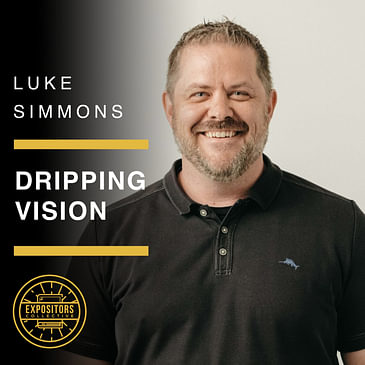What is a Vision Statement and why does it matter? Is there a point in having a "Vision Sunday" at the beginning of the year, or is the congregation better served by "dripping vision" throughout the 52 Sundays of the calendar year? Is having a church vision even Biblical? Mike asks these questions and more to the more-than-capable Luke Simmons in a fun and informative conversation about the difference between church vision and church mission, and so many other topics having to do with leading healthy churches.
Luke Simmons is the founding and Lead Pastor of Ironwood Church, a growing church in the Phoenix metro area. He’s been in full-time pastoral ministry since 2004 and has the scars to prove it. As a catalytic leader, he’s been curating resources and coaching leaders for over a decade.
Because Luke loves to learn and enjoys sharing what he’s learned with other pastors, he founded Faithful and Fruitful to help pastors experience a lifetime of joyful, God-honoring ministry.
Through resources, tools, and coaching experiences, he helps pastors build their confidence to lead for the long-haul in a changed and changing world. Faithful and Fruitful is a biblical vision of ministry and a lot of fun.
As an experienced church planter, Luke also leads the Redeemer City to City Church Planting Incubator for the Surge Network in Phoenix, where he helps planters begin their churches with theological vision, effective systems, and sustainable personal habits.
Luke has a communications degree from the University of Illinois, where he played third base for the Fighting Illini, as well as an M.A. in Missional Theology from Covenant Theological Seminary.
You can find out more about Luke's next Preaching Lab here: https://faithfulandfruitful.com/the-preaching-lab-interest/
Subscribe to Luke's podcast "Preaching Through" here: https://ptpodcast.buzzsprout.com/
Suggested Listening:
Vision Casting as a Tool to Serve God's People - Todd Peeble : https://open.spotify.com/episode/5vrAj8VyWcaTvl2NbN9vsq?si=a94e08ad028c4e71
Exposing the Word or Imposing Upon the Word - Mike Neglia : https://open.spotify.com/episode/3acaNXkFJyzTziG88cbaFp?si=62785bfe930a4ae9
True and False Pastoral Productivity - Chad Brooks: https://open.spotify.com/episode/6p7ROrx8GYSNiBM9Qk4sBq?si=f2178ed29e664f49
Pleasanton, California Expositors Collective Training Event May 24th & 25th
We’re excited to be partnering with Valley Community Church to host our first training seminar in the Bay Area. We have a lot of friends (and podcast downloads) in that part of California and we know that it is going to be a great time!
To register or for more information visit https://expositorscollective.org/gatherings/
The Expositors Collective podcast is part of the CGNMedia, Working together to proclaim the Gospel, make disciples, and plant churches. For more content like this, visit https://cgnmedia.org/
Join our private Facebook group to continue the conversation: https://www.facebook.com/groups/ExpositorsCollective
Click here to support Expositors Collective





